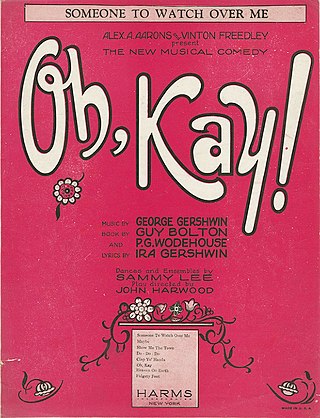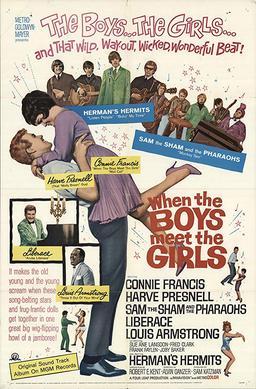Related Research Articles

Ira Gershwin was an American lyricist who collaborated with his younger brother, composer George Gershwin, to create some of the most memorable songs in the English language of the 20th century. With George, he wrote more than a dozen Broadway shows, featuring songs such as "I Got Rhythm", "Embraceable You", "The Man I Love" and "Someone to Watch Over Me". He was also responsible, along with DuBose Heyward, for the libretto to George's opera Porgy and Bess.

Ethel Merman was an American actress and singer. Known for her distinctive, powerful voice, and her leading roles in musical theater, she has been called "the undisputed First Lady of the musical comedy stage." She performed on Broadway in Anything Goes, Annie Get Your Gun, Gypsy, and Hello, Dolly!

Girl Crazy is a 1930 musical by George Gershwin with lyrics by Ira Gershwin and book by Guy Bolton and John McGowan. Ethel Merman made her stage debut in the first production and co-lead Ginger Rogers became an overnight star. Rich in song, it follows the story of Danny Churchill who has been sent to fictional Custerville, Arizona, to manage his family's ranch. His father wants him there to focus on matters more serious than alcohol and women but Danny turns the place into a dude ranch, importing showgirls from Broadway and hiring Kate Forthergill as entertainer. Visitors come from both coasts and Danny falls in love with the local postmistress, Molly Gray.

"Hard Headed Woman" is a rock and roll song recorded by Elvis Presley and published by Gladys Music, Presley's publishing company, in 1958. It is an American 12-bar blues written by African American songwriter Claude Demetrius. It was most notably recorded as a rock and roll song by Presley as part of the soundtrack for his 1958 motion picture King Creole, and was included on the record album of the same name. The song was also released as a single in both 78 RPM and 45 RPM formats. In 1958, it went to No. 1 on the Billboard charts and went to No. 2 for two weeks on the R&B chart. Notably, it became the first rock and roll single to earn the RIAA designation of Gold Record.
"There's No Business Like Show Business" is an Irving Berlin song, written for the 1946 musical Annie Get Your Gun and orchestrated by Ted Royal. The song, a slightly tongue-in-cheek salute to the glamour and excitement of a life in show business, is sung in the musical by members of Buffalo Bill's Wild West Show in an attempt to persuade Annie Oakley to join the production. It is reprised three times in the musical.
"I Got Rhythm" is a piece composed by George Gershwin with lyrics by Ira Gershwin and published in 1930, which became a jazz standard. Its chord progression, known as the "rhythm changes", is the foundation for many other popular jazz tunes such as Charlie Parker's and Dizzy Gillespie's bebop standard "Anthropology ".

Ella Fitzgerald Sings the George and Ira Gershwin Song Book is a box set by American jazz singer Ella Fitzgerald that contains songs by George and Ira Gershwin with arrangements by Nelson Riddle. It was produced by Norman Granz, Fitzgerald's manager and the founder of Verve Records. Fifty-nine songs were recorded in the span of eight months in 1959. It is one of the eight album releases comprising what is possibly Fitzgerald's greatest musical legacy: Ella Fitzgerald Sings The Complete American Songbook, in which she recorded, with top arrangers and musicians, a comprehensive collection of both well-known and obscure songs from the Great American Songbook canon, written by the likes of Cole Porter, Rodgers & Hart, Irving Berlin, Duke Ellington, George and Ira Gershwin, Harold Arlen, Jerome Kern, and Johnny Mercer.

"The Man I Love" is a popular standard with music by George Gershwin and lyrics by his brother Ira. Part of the 1924 score for the Gershwin musical comedy Lady, Be Good, the song was deleted from that show and put into the Gershwins' 1927 government satire Strike Up the Band, which closed out-of-town. It was considered for, then rejected from, the 1928 Ziegfeld hit Rosalie.

"Someone to Watch Over Me" is a 1926 song composed by George Gershwin with lyrics by Ira Gershwin, assisted by Howard Dietz who penned the title. It was written for the musical Oh, Kay! (1926), with the part originally sung on Broadway by English actress Gertrude Lawrence while holding a rag doll in a sentimental solo scene. The musical ran for more than 200 performances in New York and then saw equivalent acclaim in London in 1927, all with the song as its centerpiece. Lawrence released the song as a medium-tempo single which rose to number 2 on the charts in 1927.
"Let's Call the Whole Thing Off" is a song written by George Gershwin and Ira Gershwin for the 1937 film Shall We Dance, where it was introduced by Fred Astaire and Ginger Rogers as part of a celebrated dance duet on roller skates. The sheet music has the tempo marking of "Brightly". The song was ranked No. 34 on AFI's 100 Years...100 Songs.
"Boy! What Love Has Done to Me!" is a song composed by George Gershwin, with lyrics by Ira Gershwin. It was introduced by Ethel Merman in the 1930 musical Girl Crazy. In the 1943 film version, the song was performed by Tommy Dorsey and His Orchestra.
"Treat Me Rough" is a song composed by George Gershwin, with lyrics by Ira Gershwin. It was introduced by William Kent in the 1930 musical Girl Crazy. It was later sung by June Allyson in the 1943 film version.
"My Cousin in Milwaukee" is a song composed by George Gershwin with lyrics by Ira Gershwin. It was introduced in their 1932 musical Pardon My English. the song, indeed the show, was not a particular hit, although there's a number of vintage recordings of the tune.
"Boy Wanted" is a 1921 song composed by George Gershwin, with lyrics by Ira Gershwin. It was introduced in the musical A Dangerous Maid (1921). Philip Furia in his 1997 book Ira Gershwin: The Art of the Lyricist describes "Boy Wanted" as featuring "by far the most ambitious lyric" in A Dangerous Maid and likens the song to a 'catalog gue song' reminiscent of the work of Gilbert and Sullivan.

"The Saga of Jenny" is a popular song written for the 1941 Broadway musical Lady in the Dark, with music by Kurt Weill and lyrics by Ira Gershwin, considered now as a blues standard.

"My Ship" is a popular song written for the 1941 Broadway musical Lady in the Dark, with music by Kurt Weill and lyrics by Ira Gershwin.
Park Avenue is a musical with a book by George S. Kaufman and Nunnally Johnson, music by Arthur Schwartz and lyrics by Ira Gershwin. It was produced by Max Gordon with costumes by Tina Leser. The plot focused on the many divorces and marriages of the rich and "black tie" set. The production performed poorly and was Gershwin's last work for Broadway.

When the Boys Meet the Girls is a 1965 American musical film directed by Alvin Ganzer and starring Connie Francis and Harve Presnell based on the musical Girl Crazy and a remake of MGM's 1943 film Girl Crazy.
"I Got Plenty o' Nuttin' " is a bass-baritone aria sung by the character Porgy from George Gershwin's 1935 "folk-opera" Porgy and Bess (1934). The lyrics are by DuBose Heyward, the author of the novel Porgy on which the opera was based, and Ira Gershwin. It is one of the most famous arias from the opera and it has been recorded by hundreds of singers and music groups.
References
- ↑ Inglis, Thomas (2007). The sheet music of George Gershwin : a pictorial price guide. Vena Books. p. 64. ISBN 978-0-9784112-0-6. OCLC 637432571.
- 1 2 3 Clanton, Dan (2009). Daring, disreputable, and devout : interpreting the Bible's women in the arts and music. T & T Clark International. ISBN 978-0-567-02701-6. OCLC 676698662.
- 1 2 3 4 Furia, Philip (1997). Ira Gershwin : the art of the lyricist. Oxford University Press. p. 77. ISBN 978-0-19-535394-5. OCLC 1074289846.
- 1 2 Payne, Robert (2014). Gershwin. J. Boylston & Company, Publishers. p. 123. ISBN 978-1-883283-93-3. OCLC 1082202452.
- 1 2 Flinn, Caryl (2007). Brass diva : the life and legends of Ethel Merman. University of California Press. p. 31. ISBN 978-0-520-26022-1. OCLC 154671931.
- 1 2 3 Pollack, Howard (2006). George Gershwin : his life and work. University of California Press. p. 472. ISBN 978-0-520-93314-9. OCLC 808600707.
- ↑ Wood, Ean (1996). George Gershwin : his life & music. Sanctuary Publications. p. 199. ISBN 978-1-86074-174-6. OCLC 37222259.
- ↑ Starr, Larry (2010). George Gershwin. Yale University Press. p. 113. ISBN 978-0-300-16862-4. OCLC 1097964563.
- ↑ Blyth, Caroline (2017). Reimagining Delilah's afterlives as femme fatale: the lost seduction. Bloomsbury T&T Clark. p. 119. ISBN 978-0-567-68001-3. OCLC 1001968756.
- ↑ Carnovale, Norbert (2000). George Gershwin : a bio-bibliography. Greenwood Press. p. 161. ISBN 978-0-313-26003-2. OCLC 42289726.
- ↑ Johnson, J (2010). Ella Fitzgerald : an annotated discography : including a complete discography of Chick Webb. McFarland & Co. p. 150. ISBN 978-0-7864-4690-2. OCLC 908552106.
- ↑ Levinson, Peter (2005). September in the rain : the life of Nelson Riddle. Taylor Trade Pub. ISBN 978-1-58979-163-3. OCLC 58424440.
